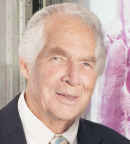The National Library of Medicine, located in Bethesda, Maryland, was started in 1836 as a small collection of medical books and journals in the office of the U.S. Army Surgeon General. In the ensuing years, the library grew to become the world’s largest and most prestigious biomedical library, with an annual budget of $400 million and a career staff of 829. Noted pathologist Donald A.B. Lindberg, MD—who pioneered the application of computer technology to health care, beginning in 1960 at the University of Missouri—was appointed Director of the National Library of Medicine in 1984, guiding the library for 30 years during its most robust period of development as a world-leading repository for scientific data. Dr. Lindberg died on August 16 following a fall. He was 85.

Donald A.B. Lindberg, MD
A Technology Futurist
Dr. Lindberg was born and raised in Brooklyn and attended Poly Prep County Country Day School. In 1954, he graduated from Amherst College magna cum laude, with a degree in applied mathematics. In 1958, he earned a medical degree at Columbia University.
Always known as a big-picture health-care person, Dr. Lindberg began to marvel at the potential of technology to revolutionize the delivery of care across broad spectrums of the health-care system. Although Dr. Lindberg was trained as a pathologist, he reinvented his career in 1960, when he joined the University of Missouri and began pioneering the application of computer technology to health care. As his research and vision matured, he realized that computers would become increasingly useful in biomedical research and patient care.
In 1984, Dr. Lindberg was appointed Director of the National Library of Medicine, where he predicated his mission on the learned assumption that computers would become increasingly useful in research and clinical care. In an announcement from the National Institutes of Health (NIH), current National Library of Medicine Director Patricia Flatley Brennan, RN, PhD, and NIH Director Francis S. Collins, MD, PhD, noted, “Don believed that medical informatics would emerge as a formal research field and academic discipline, and progress in cancer research and molecular biology would become a matter of immediate personal concern.”
According to his colleagues, Dr. Lindberg was also a consummate planner. Drs. Brennan and Collins remarked, “Don took a long view by developing long-range plans for [the National Library of Medicine] that helped him deliver on his predictions. Under his leadership, the National Library of Medicine embraced the Internet, enabling the public, health providers, and scientists to gain new or improved access to medical literature via PubMed and PubMed Central; clinical trials and their results via ClinicalTrials.gov; and consumer health information via MedlinePlus.”
Drs. Collins and Brennan recalled him as a man with a “wry sense of humor” and as “a civil servant who was committed to excellence, transparency, integrity, and public trust.”
Health Information Innovator
Dr. Lindberg was elected the first President of the American Medical Informatics Association. He was also a founding member of the Health on the Net Foundation, an international organization devoted to guiding patients and providers to sound, reliable health information. As the country’s “senior statesman for medicine and computers,” he has been called upon to serve on many boards including the Computer Science and Engineering Board of the National Academy of Sciences, the National Board of Medical Examiners, and the Council of the Institute of Medicine of the National Academy of Sciences.
“Under his leadership, the National Library of Medicine embraced the Internet, enabling the public, health providers, and scientists to gain new or improved access to medical literature via PubMed ...”— Patricia Flatley Brennan, RN, PhD, and Francis S. Collins, MD, PhD
Tweet this quote
As an innovator in rolling out computer applications to aid doctors and patients, Dr. Lindberg was asked once during an interview what system he helped develop has had the most impact. He responded, “Perhaps MedlinePlus, a database that tells you things like what chemicals and drugs get into mother’s milk, has had a lot of influence. If you’re lactating, it is of great interest. The major change in our whole field was The Human Genome Project. That project has produced millions and even billions of facts that would only achieve meaning if they were put together to answer questions, which was done through MedlinePlus.”
Dr. Lindberg was the author of three books and several book chapters, as well as more than 200 articles and reports.
He is survived by his wife, Mary Musick Lindberg; a brother, Charles Frank Lindberg; sons, Donald Allen Bror Lindberg II and Jonathan Edward Moyer Lindberg; daughters-in law, Amy Leigh Frank Lindberg and Kelly McGee Lindberg; and grandchildren, Frances Marie Musick Lindberg and Christopher Martin Jurgen Lindberg. ■

